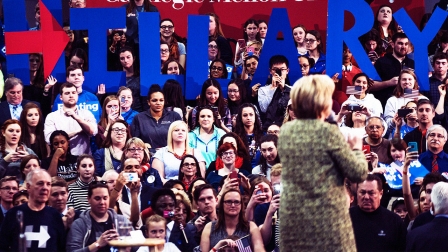How A 2008 Field Organizer Became One Of Hillary Clinton’s Top Directors
Every morning Brynne Craig arrives at the Hillary Clinton headquarters in Brooklyn by 7 a.m. to do a load of campaign tasks—planning state outreach, reaching out to coalitions, prioritizing new small-scale projects—although they change everyday. This week, with the Democratic National Convention her schedule will be even crazier There she’ll be keeping tabs on all the projects she currently mans while helping to facilitate the quadrennial conference.
Craig is Clinton’s National Deputy Director of State Campaigns and Political Engagement She’s been working with the campaign on and off for nearly a decade. I recently chatted with her about her trajectory.
Politics in 2016 is dizzying—social media has made it possible for more people to participate and for more constant barrages of voices. Honing this constantly changing landscape requires a knowledge of how to excite and engage people. Craig began as a field organizer for Clinton’s 2008 campaign in Nevada. From there, she went on to be a field director for Obama’s campaign. After he was elected, Craig continued field-directing for the DNC in various capacities. In 2013, she worked as Virginia Governor Terry McAuliffe’s political director during his campaign. Following that, Craig took a role in Clinton’s personal office, which ultimately led to her current position.
Field work and organizing, however, defined the political person she is today. To this day she says that being a field organizer was one of her best positions. “You had to go in everyday and organize a community. You got to identify people in the community that would take leadership of their precinct.” They’d start off as random people who would potentially be supporters. Then, months later, those same people that she had cold called had become caucus leaders for the Clinton campaign. That sort of engagement and outreach is what made made field organizing so exciting for Craig—the one-on-one connections she found with other supporters.

From Organizer To Campaign Director
For many people, organizing and field work make for an uncertain career trajectory. Working tirelessly in the trenches—calling up potential supporters, stopping them in the streets, facilitating local events—it’s hard to imagine how that could lead to a career in national politics. “When I was a field organizer,” admitted Craig, “I could only see past what was right in front of me.”
But she says she learned that the skills of being forced to galvanize people around a cause everyday make you ready for nearly anything. “The skill set of an organizer is such that you can really plug into anywhere,” she said. This work ethic of coalescing people around a unified cause and getting citizens engaged and excited has undoubtedly bled into the work she does now. Her role over the last year has been to track delegates, check in on primary states, ensure overall campaign projects are going smoothly, and endless other tasks. But they all require, in some capacity, knowledge of the field—something she first learned nine years ago in Nevada.
Craig said what she’s constantly reminded of now is the “state perspective.” That is, understanding the local minutiae that affect everyday Americans—what certain communities care about and getting them to care about national politics. While a presidential campaign feels big and vast and encompassing, what makes or breaks one is how well it works at a small level. Sometimes while working in headquarters, she said, you have to hone the focus to understand what’s at stake. There are many big things happening on a national scale, but really “the most important thing happening that day is what’s happening in the states,” she said. “You sometimes forget that unless you are someone who started in the states.”
Looking Back To Look Forward
All of her state-by-state work will be coming to a head this week. The Clinton campaign spent well over a year working state by state to win the nomination. Now they will be looking ahead to general campaign.
Given her background with numerous election cycles, I asked Craig if anything has significantly changed over the last many years. In her eyes—at least from the organizing standpoint—not so much.
What has changed is the rhythm and frequency of information. Something is always happening, she said, and there’s no down time. “Back in in 2007 and 2008,” she said, “Facebook was there, Twitter was kind of a thing…. Everything was still happening, but you weren’t being inundated with it.” Today, with the constant barrage of media, the campaign work is 24/7. Before, the news cycle was when people watched or read the news. Now a tweet can go viral at 4 a.m., which could have a real impact on the campaign.
With that, Craig’s state background is probably helpful. As an organizer, you have to be ready for any hiccups because you’re lynchpin of on-the-ground political events. That’s probably why she is so proud of where she came from. “Yeah, I also am a political person now,” she said, “but at the end of the day, I am an organizer.”
Fast Company , Read Full Story
(15)













